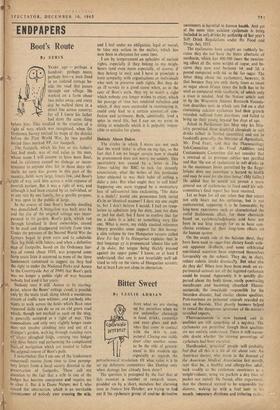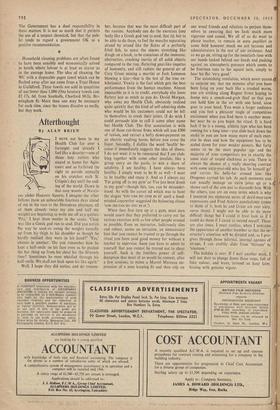Bitter Sweet
By LESLIE ADRIAN
JUST what we arc storing up for ourselves when we use unfainiliar chemicals in food, drinks, cosmetics and even glues and pol- ishes that come • in contact with the skin is con-
jectural. Closing one stable
I II door after another seems to be the role of govern-
ment in this modern age
especially as regards the , petrochemical revolution. Of what value is it to set' up• defensive committees like Dunlop only -when damage has already been done?
The question is prompted by the fact that at this moment a number of research teams, prodded on by a short, mundane but alarming item in Nature kik October, are trying to find out if the cyclamate group-of coal-tar derivative sweeteners is harmful to human health. And yet at the same time calcium cyclamate is being included in soft drinks by authority of Past year's Soft Drink Regulations under the Food and Drugs Act, 1955.
The cyclamates have caught on suddenly be- cause they do. not have the bitter aftertaste of saccharin, which has 400-500 times the sweeten- ing effect of the same weight of sugar, and be- cause they now cost between la and 2d. a pound compared with 6d. to 8d. for sugar. The bitter thing about the cyclamates, however, is that because they are only thirty times as sweet as sugar about fifteen times the bulk has to be used as compared with saccharin, of which only a trace is needed. And the Nature article sent in by the Wisconsin Alumni Research Founda- tion describes tests in which rats fed on a diet containing calcium cyclamate had their growth retarded, suffered from diarrhoea and failed to bring up their young beyond five days of age. Asked in Parliament last May why his Min- istry permitted these doubtful chemicals in soft drinks (albeit in limited quantities) and not in foodstuffs generally; the Minister of Agriculture, Mr. Fred Pearl, said that the Pharmacology Sub-Committee of the Food Additives and Contaminants Committee did not consider that a reversal of its previous advice was justified and that 'the use of cyclamates in soft drinks up to the maximum limits permitted by the Regu- lations does not Constitute a hazard to health and may be used for the time being.' (My italics.) He added that he would not permit a more general use of cyclamates• in food until his sub- committee's final report has been received.
Let us hope for all our sakes that that report not only bears out his optimism, but is not controverted, supposing it to be favourable, by long-term experience such as characterised the awful • thalidomide affair, for these chemicals based on cyclohexylsulphande acid have not been in use !Ong enough for us to have con- clusive evidence of their long-term effects on the human system.
On the credit side of the balance sheet, they have been used in sugar-free dietary foods with- out apparent ill-effects, and some celebrated nutritional scientists have expressed themselves favourably on the subject. They do, in short, reduce calorie intake drastically. But what else do they do? When tests have been made on ex- perimental animals not all the ingested cyclamate could be traced. Apparently it is quickly dis- persed about the body tissue, easily penetrating membranes and becoming absorbed Fluoro- acetamide, the insecticide responsible for the Smarden disaster, had similar elusive qualities. Post-mortems on poisoned animals revealed no trace of fluoride, That ghastly business helped to reveal the dangerous ignorance of the nation's so-called experts. • Fluoroacetamide is now banned, and its qualities are still something of a mystery. The cyclamates arc permitted though their qualities are not entirely understood. There is still reason- able doubt whether the missing percentage of cyclamate had been excreted, Hardheaded, 'practical' people wilt probably feel that all this is a lot of rot about rats. An American doctor, who wrote to the Journal of the American Medical Association last month, says that he, a healthy and allergy-free adult, took readily to the cyclamate sweeteners as a weight-reducer, using 'six packets a day (size of packet not stated). He found, after experiment, that the chemical seemed to be responsible for diuresis, waking up with a foul taste in hip mouth, temporary dizziness and irritating rashes.
The Government has a dual responsibility in these matters. It is not so much that it permits the use of a suspect chemical, but that the pub- lic tends to regard a government OK as a positive recommendation.
Household cleaning problems are often, found to have been sensibly and economically solved in hotels where labour is at least as scarce as in the average home. The idea of cleaning the WC with a disposable paper towel which can be flushed away after use came from a Trust House in Guildford. These towels are sold in quantities of not fewer than 1,000 (Ozo lavatory towels cost £2 17s. 6d. from Southalls, Charford Mills, Bir mingham 8).. More than one may be necessary for each time, since the tissues dissolve so easily, but they work.







































 Previous page
Previous page